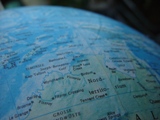
In Lesotho, South Africa and many other African countries, devices that restrict consumers to only using water that they have paid for in advance are being promoted as a way to fund better water infrastructure.
Church water experts warn, however, this approach endangers the access of the poorest of the poor to this indispensable necessity of life.
Pre-paid water meters work very much like pre-paid cell phones. People buy a card with a credit corresponding to a certain amount of water. When the card is inserted into a machine – either a household’s water meter or at a public point – water can be tapped until the card is empty. Whereas cell phones usually enable the owner to call emergency numbers even when the credit is used up, the pre-paid water meters, however, cannot take into account how urgent a person’s need is.
"The pre-paid water meters are highly problematic," says Michael Windfuhr, human rights director of the German Protestant agency Bread for the World, and a member of the Ecumenical Water Network steering group. "If you run out of money, and the card is empty, you cannot afford water for basic needs. This is a violation of the human right to water. It should be impossible to be disconnected from water, since it is a basic need for every human being."
The Ecumenical Water Network was formed by Christian agencies and movements to raise the awareness of churches about the urgency of issues linked to water. Pre-paid water supply systems were a key topic discussed during a conference of the network in Lesotho’s capital, Maseru, in April.
Water professionals from around Africa are currently looking to the mountain kingdom because the pre-paid water meters recently installed in public places by Maseru’s water company are seen as a model by the industry.
Larry A. Swatuk, of the University of Botswana’s department of political and administrative studies, wrote in 2002 when a new allocation of water resources began to occur. "The new water architecture shows trends toward privatisation of water resource development, management and service. Cash-strapped SADC [Southern African Development Community] countries claim it is necessary to involve business in what are called ‘public-private partnerships’."
Under the old system, where people paid bills after using the water, they could not be cut off from the water without a warning, Windfuhr explains. Now they can suddenly find themselves without a safe drinking water supply and may be forced to use possibly unhealthy water sources.
Windfuhr also argues that most problems regarding water are due to policy, and not scarcity. "In very dry countries, you can still see irrigated golf courses. In Burkina Faso, some people daily use 250 to 400 litres of water, while other people do not have the 50 litres they need a day. In areas with real scarcity it is nonetheless important to supply people with water."
Molefi Ndlovu of the Centre for Civil Society in Durban, South Africa, says the example of pre-paid water supply in Johannesburg, the country’s biggest city, demonstrates the danger of discrimination against the poor.
"The pre-paid water meters are installed in order to save water. Still the pre-paid water meters only apply to the poor black communities, and not to the hedonistic suburban communities where water is wasted," says Ndlovu. He tells of stories of resistance against these meters under the slogan "Destroy the meters, enjoy the water". Citizens who resort to such measures risk fines and imprisonment, but they say they are desperate.
Others have sought the courts to stop the new pre-paid system. The Johannesburg high court ruled recently that the current situation abrogates the South African constitution. It declared that people should be able to chose between prepaid and traditional meters.
The Ecumenical Water Network is now urging churches to get involved in advocacy work for the human right to water.
Dr Åsa Elfström, the Church of Sweden’s senior advisor for water and development, and a member of the network’s steering group, explains: "The church has a history of supporting the poorest and most marginalised people. The people without access to water do not have a strong voice. The church is highly regarded in most countries, and if it raises its voice, it could make governments change their policy."
Ecumenical Water Network: http://water.oikoumene.org
This is an edited version of an article written by journalist Christian Johannessen for the World Council of Churches (www.oikoumene.org/) Ecumenical News International
Photo : WORLD NEWS
 JourneyOnline
JourneyOnline






